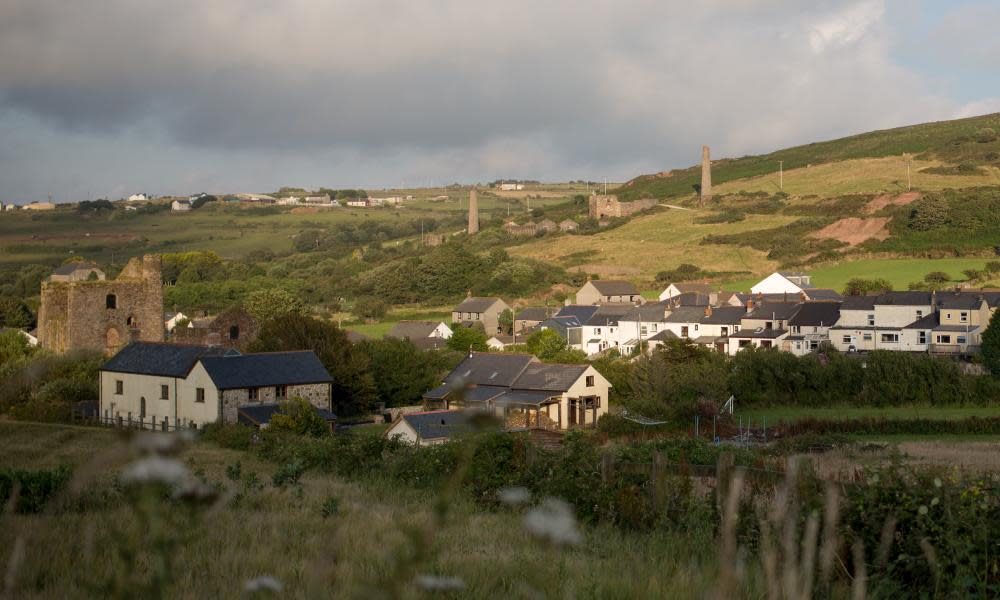City dwellers idealise Britain's countryside, but there's no escaping rural poverty

The British countryside, or at least the seductive popular myth of the rural idyll, has become increasingly vivid in the public imagination as the pandemic continues. Covid has caused many to reassess their lives, and for city dwellers, that often includes where and how they want to live. “What am I doing here, so far from nature?” as one London columnist mused at the height of lockdown.
For urban dwellers with means, whose work allows them to be free from proximity to the office, rural living offers the heady promise of a refuge from the suddenly alarming cheek-by-jowl intimacy of the city, and all its noisy modernity. Fleeing to the country seems to offer respite from pollution, poverty, astronomic living costs, high rents and spiralling Covid infection rates. But is it really the promised land?
Related: Living standards for UK's poorest plunge during pandemic
A paper by the Cardiff University geographer Andrew Williams and colleagues offers a reality check, pointing out that austerity did not bypass rural England and Wales. It too has seen big cuts to public infrastructure and services. Rural housing has its own affordability crisis. Poverty, so often imagined solely as an urban affliction, thrives, though often hidden, amid the pretty market towns and rolling green fields.
The disconnectedness of rural living may be part of its charm but it is also a driver of inequality, the paper points out. Almost no one in urban areas lives more than 4km (2.5 miles) from a GP – one in five households in rural areas do. It is the same for supermarkets: 44% of country dwellers have to travel more than 4km to get to one, while 59% are not within 4km of a bank. Public transport has been decimated – if you don’t have a car, good luck.
The closure of Sure Start children centres, jobcentres and youth clubs has exacerbated the access problem. Of 605 libraries closed in England since 2010, 150 were in rural areas. They were more likely to be rescued by volunteers in urban areas, Williams points out, “suggesting that the ‘rural’ is not quite the ‘ideal laboratory’ for community-run public services that it is made out to be by proponents of the big society.”
One way rural local authorities have sought to mitigate the cuts enforced on them by central government is by “switching” services such as public toilets and parks to the care of parish and town councils, who raise local taxes to pay for them. Not a problem for wealthy villagers but hardly fair to those who are less well off, who are in effect taxed twice at a time when their incomes have been shrinking as a result of welfare cuts.
Many rural economies are weak, even in the prettiest, chocolate boxy parts. Low wages and casual labour are rife, and the rural premium on fuel and food is eye-watering. Households in rural hamlets with a car spend an average £139 a week on transport, compared with £79 in urban areas. More than 40% of households in rural Wales live in fuel poverty, says Williams, compared with 22% in urban areas. Similarly, people in isolated rural areas spend an average £71 a week on food, compared with £61 in cities.
Fall on hard times, and the nice views may not entirely compensate. Rural benefit claimants are significantly more likely to receive higher-level sanctions than their urban counterparts. Food banks can be few and far between. Devon has one food bank for every 45,000 people; in Cumbria it is one for every 62,000. Williams’ field work brought him into contact with hungry, penniless people forced to walk miles for a bag of charity food.
What is to be done? The mostly Tory-controlled county councils in England have lobbied the government to invest more in rural areas at the expense of (mainly Labour-run) urban areas. It’s not an either-or, says Williams, we need a bigger funding pot. Pitting city versus shire in a bitter fight over the shrivelled local government settlement is no basis for an ambitious national, locally-led, Covid recovery strategy, nor a way to heal the divisions of Brexit. Williams, meanwhile, calls for a new development plan that takes rural Britain seriously: one that reimagines the countryside “in terms of future desires rather than nostalgic myths”.
• Patrick Butler is the Guardian’s social policy editor

 Yahoo News
Yahoo News 
